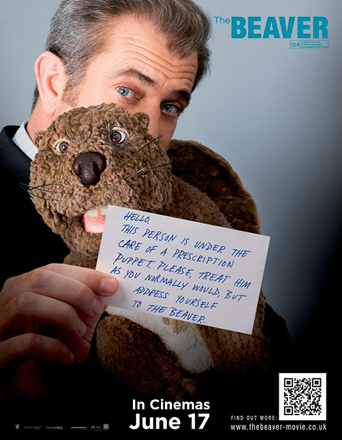The Beaver ***
 Mention Mel Gibson’s new film The Beaver, and the standard retort is, “who wants to see that?” after what the actor’s said in public. Reminiscent to loathing a political party, based on a figurehead’s opinions and actions, fallen star Gibson has a lot of campaigning to do. But putting all the less-than-attractive Gibson character traits aside, and merely looking at The Beaver as a relationship story about coping with mental illness, it does highlight what a great actor Gibson is – a pity, considering his name will put some off considering this as a viable cinema choice.
Mention Mel Gibson’s new film The Beaver, and the standard retort is, “who wants to see that?” after what the actor’s said in public. Reminiscent to loathing a political party, based on a figurehead’s opinions and actions, fallen star Gibson has a lot of campaigning to do. But putting all the less-than-attractive Gibson character traits aside, and merely looking at The Beaver as a relationship story about coping with mental illness, it does highlight what a great actor Gibson is – a pity, considering his name will put some off considering this as a viable cinema choice.
The Beaver, directed by and co-starring Jodie Foster, is an emotional story about a man called Walter Black (Gibson) with an escalating mental illness who wants to get better and rebuild his family, but initially feels he can only live in the real world through the aid of a discarded puppet called the Beaver. Once a successful toy executive, Black deals with his demons by letting the Beaver speak for him, to the success of his ailing business, but to the detriment of his family life: His wife, Meredith (Foster), feels more and more alienated by his behaviour, although she tries to incorporate it as part of his healing process. Walter’s older teenage son, Porter (Anton Yelchin), who spends his life being the voice of others via the written word, tries blocking out his father’s worst characteristics he feels he’s adopting, making him hate Walter all the more. The only one who gets Walter is his young son, Henry (Riley Thomas Stewart), who relates to the Beaver – and his father – via woodwork crafts. It takes a tragedy to rally the family into take action, before their bonds are damaged beyond repair.
Without a doubt, writer Kyle Killen’s short story about a ‘talking’ beaver has evolved into an immensely thought-provoking, touching and original screenplay about the effects of depression. Indeed, far from patronising those with the illness, stories and characters have helped sufferers and their relatives deal with its effects in the past – take Ellverton’s Taming the Black Dog, for example. Hence The Beaver feels like a cinematic explanation that doesn’t attempt to find a solution in 90 minutes, but tries to paint a picture of one person’s experiences.
All the adult cast inject an emotional wealth and complexity into their characters that make for some gruelling viewing moments, compared to lighter-hearted and hopeful ones. It seems Foster still has the tricks of the trade since Little Man Tate (1991) to get the most poignant, natural and spontaneous reactions out of her stellar cast, particularly the younger actors, and possibly down to her own friendship and connection with Gibson.
Gibson brings the much-needed inner turmoil laced with subtle humour and child-like insolence to the part of Walter as he explores his ‘alter ego’ and the hold it has on him. Walter’s own love-hate relationship with the Beaver takes an abrupt, stomach-churning turn, but one necessary to push the film onto the next phase and the road to salvation. The irony is this film was made long before Gibson’s ‘public escapades’, but with hindsight, you can’t help watching it as a redemption piece for his character and career, especially one scene when the Beaver delivers rough justice on its human mannequin.
On the downside, some of the Black-est moments seem borderline glib, enhanced by a dubious, upbeat soundtrack, and The Beaver has some stagnant, complacent parts to its story that make proceedings drag a little. Although the introduction of Jennifer Lawrence as popular girl Norah is designed to stir the real Porter from his comatose self – and add a touch of ‘glamour’ to the neutral colour palate of the film, it does feel like an odd sub-plot, like the marriage of a teen-angst drama of the Heathers ilk, to a more serious character study, like The Madness of King George. Still, Yelchin does not disappoint, bringing a Charlie Bartlett ‘oddball’ side to Porter – if a less witty one, and does his best opposite Oscar-nominated Lawrence (Winter’s Bone) in character development. Foster furrows her brow and stumbles her words in a role we’ve seen her enacted countless times, but still adequately gets her character’s message of personal hardship across.
Gibson or no Gibson, The Beaver is never going to be an easy sell on subject matter alone. But curiosity over a Gibson screen return may make this a surprise box office climber – and a warm-up act for the greatly anticipated How I Spent My Summer Vacation this year. Maybe Gibson can get The Beaver to do all the talking from now on?
3/5 stars
By @FilmGazer
WATCH THE TRAILER HERE